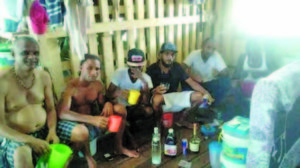Following the now infamous Mother’s Day party held by inmates at the New Amsterdam Prison, Director of Prisons, Gladwin Samuels has assured that disciplinary action was currently being taken against the offending ranks.
The Director of Prisons provided this assurance on the side-lines of an event at the Police Training Centre on Monday. According to Samuels, the matter is being treated as a priority and once some additional information was acquired, a neutral adjudicator would be brought in.
“The procedure for internal charges is similar to the court system. The person must be issued with a charge sheet; they would have time in order to prepare for their trial, so we’re currently in the process of doing that,” Samuels said.


Gladwin Samuels
“They also have a right to object to the adjudicator. So, more than likely because of the nature of the offences, we would have to have neutral adjudicators travel to New Amsterdam, in order to deal with those cases. But it is something being given priority.
“What we are waiting for right now is some external information that we have written to request, in terms of (combining) some of the information that we would need during the investigation.”
This, he said, will serve to establish if indeed the prisoners were in contact with prison officers who were named as having provided the alcohol and drugs that were seen on the Facebook posts.
Besides information suggesting telephone contact to facilitate the collusion, Samuels said that four ranks who failed in their duties on the day in question have been identified. He noted that the lapses were evident by the very pictures that were circulated of the party-loving inmates.
“Closely examining the photographs on Facebook, it would show you that the drinking took place in two parts of the prisons…the dining hall, where prisoners would be during the day and then the number one dormitory,” Samuels observed.
“Many of the prisoners who were seen drinking in the number one dormitory, based on our segregation that we do, they should not have gone to that dormitory. So, it shows clearly that there was a breakdown in terms of the management of the prisoners on that day.”
Pay
Samuels acknowledged recent comments from Public Security Minister Khemraj Ramjattan about the small salary being paid to prison officers. He, however, maintained that officers who are dissatisfied with their salaries should resign, rather than endanger the lives of others through collusion with prisoners.
IDB/CSSP study
Monday also marked the official launch of the Citizen Security Strengthening Programme (CSSP) prison survey report. The report was a collaborative effort with the Inter-American Development Bank (IDB) and the University of Guyana in keeping with component three of the programme.
In the report itself are some compelling findings. For instance, the report found that six out of ten inmates were physically punished to some degree by their parents or guardians, when they were children.
“One out of four respondents reported that their father or mother’s partner used to beat their mothers. In four out of ten cases, the inmates’ parents or adults with whom they lived as children drank alcohol frequently.
“One out of five inmates said there were gang members or they belonged to criminal groups in the neighbourhood where they lived as minors. Four out of 10 inmates stated that they had a family member who had been sent to prison,” the report states.
The survey also found that most inmates have either used marijuana or have actually been incarcerated for drug possession or dealing. This is a poignant finding, as decriminalising marijuana is a prevalent topic at the moment.
“Six out of 10 prisoners reported having consumed marijuana, 7.6 per cent cocaine base paste, cocaine, or crack, and 6.4 per cent pills or ecstasy. Two most frequent crimes for which the inmates were arrested in Guyana was intentional homicide or murder – 34.9 per cent and drug possession or drug dealing – 21.3 per cent.”
The CSSP is funded by the IDB, with US$74,200 being allocated for the survey. At the handing-over ceremony on Monday, Resident Representative Sophie Makonnen laid bare some of the challenges. Makonnen cited statistics on the Guyana prison system, such as the prison population rate.
CSSP Project Manager Clement Henry hailed the initiative as one that would highlight the root causes of criminal recidivism. He noted that the results of the survey would aid development of rehabilitation and reintegration policies for prisoners.



